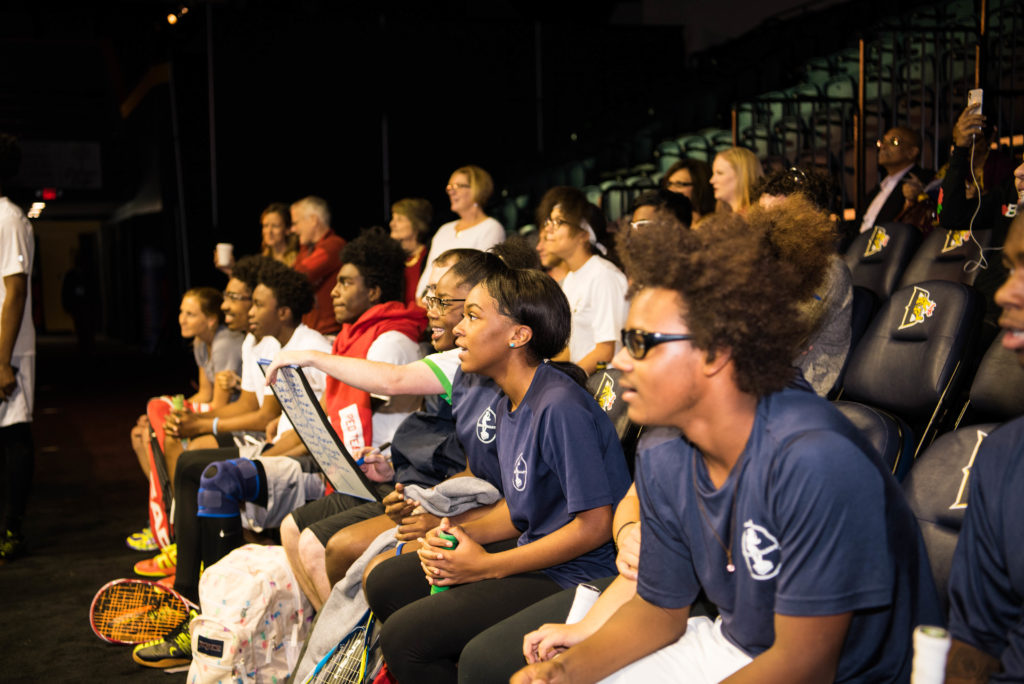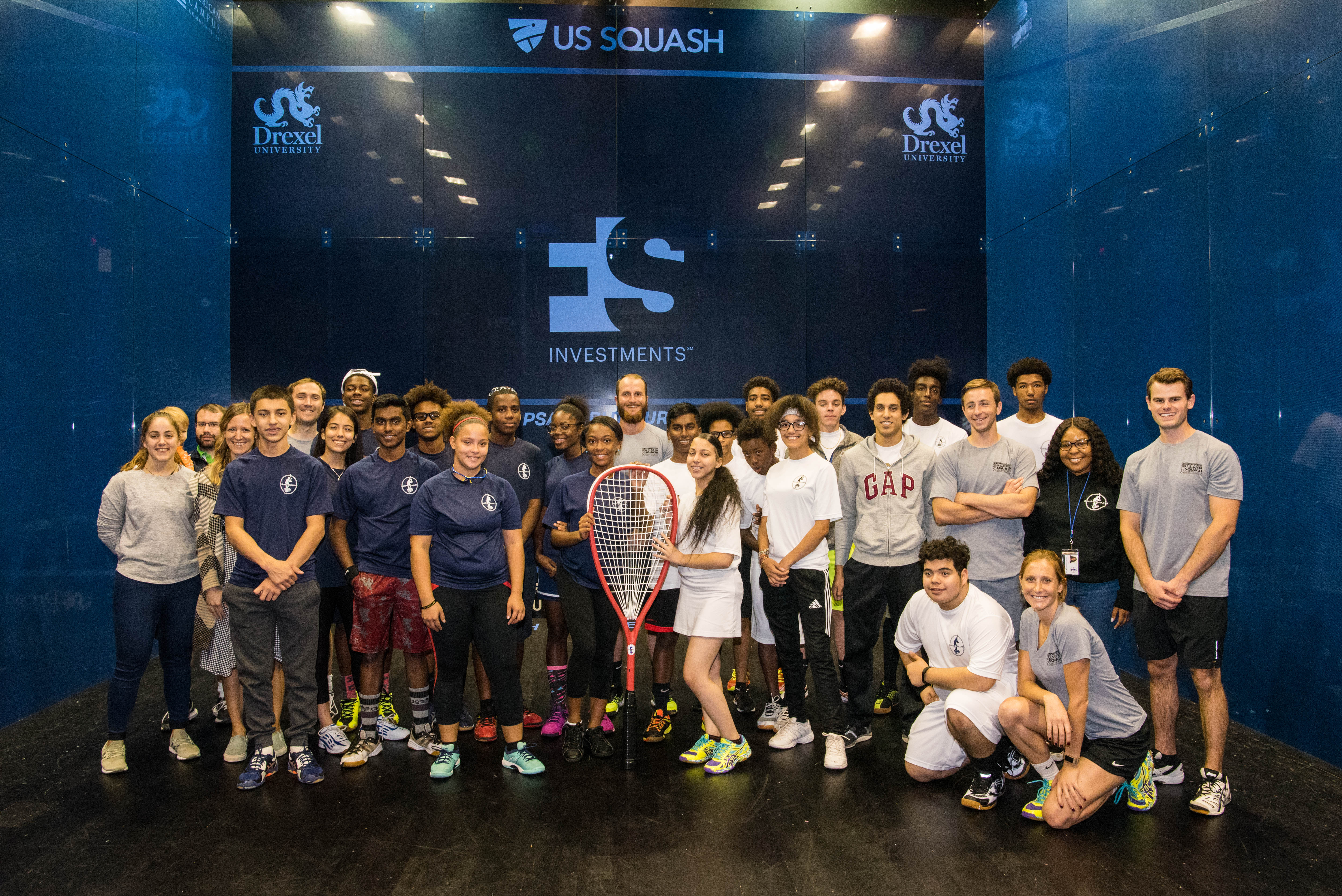With its planned fall 2020 opening, the Arlen Specter US Squash Center will act as the anchor facility for the development of squash in the United States. The Specter Center’s programming will support all of the core elements of US Squash’s mission and objectives: access, community, excellence and sportsmanship.
The Specter Center—located in the historic Armory building on the campus of Drexel University in Philadelphia—will offer unparalleled access to squash by modeling broad-based community engagement. The extraordinary combination of twenty squash courts in proximity to urban, suburban and university resources and community partnerships will make the sport available to a broad spectrum of participants in a major metropolitan area. At the same time, it will act as a proving ground for new US Squash programs for grassroots development nationwide. The Specter Center will imitate successful community programs around the country and simulatenously be a model for others. It will also pilot new programs to further develop the sport. Both new and expanded programs will draw upon proven and emerging models from around the world to create new opportunities for play.
US Squash, along with its official community partner SquashSmarts—Philadelphia’s urban youth squash and education program—and a host of other local partners envision a diverse community that will foster and strengthen connections within the Philadelphia region, creating a true home for squash locally and extend outwards, sharing best-practices throughout the country. As much as it will be a national model, the Specter Center will also be hyper-local. A robust community will convene there. It will change lives by being a place to come and a place to be, a home in the neighborhood.
The Specter Center will not directly emulate or compete with successful local clubs and programs within Philadelphia or the surrounding region; instead, it will focus on three concentric programmatic elements:
1. Introduce new players to the sport by actively engaging children and adults in the surrounding community through innovative programs
2. Enhance the experience of participants in US Squash events, tournaments and national championships
3. Develop top athletes to reach their potential in all lifecycles: junior, collegiate and professional

With many other area clubs and facilities so vibrant and viable, the Specter Center will also serve as a feeder to area programs by developing new players. The Specter Center will take pride in introducing people from all walks of life to the sport with regular, free and accessible clinics.
“US Squash has been advocating for accessibility for years,” said Barrett Taskesian, executive director of Portland Community Squash in Portland, Maine. “Dozens of emerging cities are answering the call with what we call ‘community squash’—a commitment to using squash to build inclusive and intentionally diverse squash communities. Portland Community Squash is packaging our model for emerging cities at no cost. I’m confident the model will grow stronger within the Specter Center.”
Community accessibility will manifest in many different ways including being open to the public with courts available for free during designated times. Proactive outreach offering free programming for people living or working within the immediate area will take place.
Pay-per-court session options during designated times will serve area enthusiasts, with the additional ability to reserve a court in advance for a nominal fee (likely less than $10 per player), and individual membership packages will allow the regular players to reserve courts further in advance. Group membership packages for facility use by members of Drexel University, University of Pennsylvania, University of the Sciences in Philadelphia and Community College of Philadelphia will encourage active engagement by these neighboring institutions.
In partnership with SquashSmarts, programming will be rooted at the Specter Center’s in-house Learning & Innovation Center to support children in reaching their full potential academically, athletically and in life. Vigorous programs for area elementary, middle and high schools will take place throughout the day with introductory programs, clubs and teams seeded collaboratively with SquashSmarts throughout the city in order to build and sustain a Philadelphia squash community.
“The appetite for squash—and the recognition of SquashSmarts’ brand of high-quality, collaborative, relationship-driven programs—is growing,” said Stephen Gregg, SquashSmarts executive director. “Our board and staff are incredibly excited to be a part of this special, community movement in squash.”
Over the past year, SquashSmarts community impact director Nabilla Ariffin has facilitated many conversations with regional, national and international community programs to learn more about their models and impact while simultaneously fostering dialouges with new and existing partners in the city’s local public, paraochial, private schools and community-based organizations. Arrifin also serves as the director for the bureau of sports—a volunteer role advising the International Youth Federation—and was one of twenty young leaders around the world to be invited to join “Cohort 2030,” a project led by the Federation in partnership with Carnegie Mellon University and the Rockefeller Foundation.
“We’ve learned an enormous amount from leaders around our city, around the country and around the globe,” Ariffin said. “We’re excited to generate new programs and ideas that provide innovative solutions to social issues through squash—and to do it in cooperation with an extensive group of thought-leaders and partners. We see each partner playing a pivotal player in a strong network of people, a network from which strong community squash programs can be built.”





